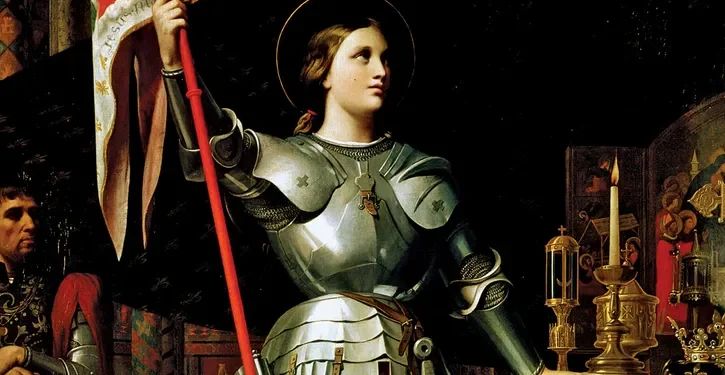Joan of Arc, also known as Jeanne d’Arc, is one of history’s most remarkable figures. Born around 1412 in Domrémy, France, she emerged as a national heroine and a Catholic saint. Her life and legacy are marked by her extraordinary role in the Hundred Years’ War between France and England.
As a young peasant girl, Joan claimed to have visions and heard voices of saints, including Saint Michael, Saint Catherine, and Saint Margaret. These celestial messages, she asserted, guided her mission to support Charles VII, the Dauphin of France, and reclaim his throne from English domination. At the tender age of 16 or 17, Joan approached Charles, convincing him of her divine mandate. Despite initial skepticism, her fervent faith and convincing demeanor led to her being granted an audience.
In 1429, Joan of Arc was given command of an army, an unprecedented honor for a woman of her time. Clad in white armor and bearing a banner that read “Jesus Maria,” she inspired troops with her piety and determination. Her most notable military success was the lifting of the Siege of Orléans. The victory was pivotal, revitalizing French morale and turning the tide of the war in favor of Charles VII. Joan’s presence and leadership were instrumental in several subsequent victories, further solidifying her reputation as a divinely guided warrior.
However, Joan’s fortunes shifted dramatically in 1430 when she was captured by Burgundian forces, allies of the English. Sold to the English, she was subjected to a politically motivated trial orchestrated by Bishop Pierre Cauchon. The trial, laden with charges of heresy, witchcraft, and cross-dressing (for wearing male military attire), sought to undermine her influence and discredit Charles VII. Despite her articulate defense, Joan was convicted and, on May 30, 1431, was burned at the stake in Rouen at the age of 19. Her execution intended to eliminate her as a threat, but it only solidified her martyrdom.
Twenty-five years later, a posthumous retrial ordered by Pope Callixtus III declared her innocent, and she was exonerated of all charges. Joan of Arc’s legacy endures; she was canonized as a saint in 1920 by Pope Benedict XV. She symbolizes unwavering faith, courage, and the struggle for justice. Today, she remains a cultural icon, celebrated in literature, art, and popular culture, embodying the spirit of national pride and resilience.
Joan of Arc’s story is a testament to how a single, determined individual can alter the course of history. Her life, marked by divine inspiration and extraordinary bravery, continues to inspire people worldwide.
newshub



Recent Comments